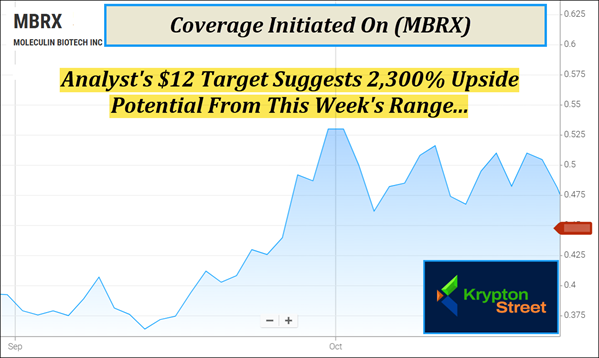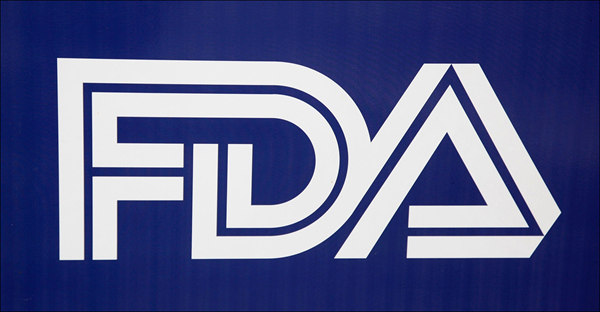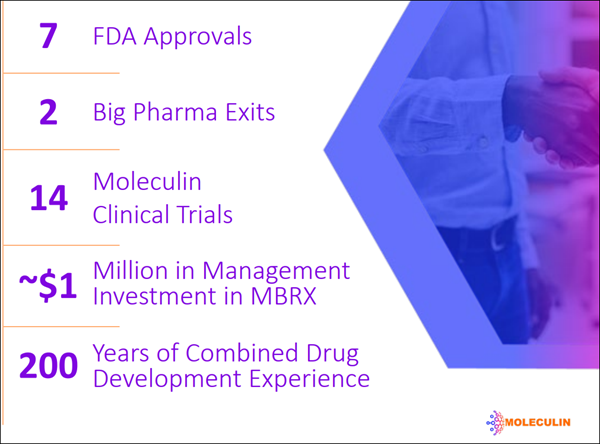*Sponsored
Krypton Street Announced Coverage On (Nasdaq: MBRX) Starting Tomorrow Morning—Thursday, October 23, 2025
Here's What We Can Tell You Tonight…
Analyst Coverage: Targets From $4 To $12 Suggest 700%–2,300%
Upside Potential For (Nasdaq: MBRX).
Limited Float: Less Than 30M Shares Give (Nasdaq: MBRX) The Potential For Significant Swings If Demand Begins To Shift.
Under The Radar: Trending Under $1, (Nasdaq: MBRX) Remains Largely Unnoticed While Quietly Building Momentum Potential.
Pull This Up Before Tomorrow Morning…
October 22, 2025
Tomorrow's Focus | See Why (Nasdaq: MBRX) Just Hit Thursday's Radar Dear Reader, It's not often you see a clinical-stage biotech push forward with data that makes even the skeptics stop scrolling. When science speaks this clearly, the noise tends to fade — and what's left is momentum backed by results. That's the backdrop behind what's unfolding right now with Moleculin Biotech, Inc. (Nasdaq: MBRX).
Fresh from one of the most exciting corporate updates we've seen this quarter, the company is entering a phase that could reshape how it's viewed in oncology circles. Tomorrow morning — Thursday, October 23, 2025 — Moleculin Biotech, Inc. (Nasdaq: MBRX) will be topping our watchlist as it moves into what may prove to be a turning point in its story. But keep in mind, (MBRX) is still trending below $1, meaning it hasn't yet landed on most screens as it remains in discovery mode for many readers. According to Yahoo, (MBRX) has less than 30M shares listed in its float. When floats are this small, there's potential for big moves if demand begins to shift. Analysts have started to take notice: Jason McCarthy at Maxim Group and Sara Nik at H.C. Wainwright has both set a $4 target according to TipRanks— which suggests 700% potential upside from this week's $0.50 range — while Jonathan Aschoff at Roth MKM placed a $12 target, which suggests 2,300% potential upside. 
With multiple late-stage programs advancing and near-term data readouts ahead, the company's October 2025 corporate update paints a picture of a biotech positioned for transformation — one built on innovation, credible science, and clear execution. A Next-Generation Approach to Anthracyclines
At the core of Moleculin's story is Annamycin, also known by its nonproprietary name naxtarubicin — a patented next-generation anthracycline designed to eliminate one of the biggest safety challenges in chemotherapy: cardiotoxicity. Traditional anthracyclines like doxorubicin have well-known cardiac side effects that limit dosing and repeat cycles. Annamycin, by contrast, demonstrated zero cardiotoxic events across roughly 100 patients treated, even at doses exceeding five times the FDA's lifetime exposure limit. Independent review by the Cleveland Clinic and the FDA confirmed the absence of cardiac injury markers — a key differentiator that allows for multiple treatment cycles, higher dose intensity, and the potential to combine with other therapies like Ara-C and Venetoclax. In short: Annamycin aims to do what prior chemotherapies could not — deliver strong efficacy without compromising the heart. FDA Endorsement Strengthens The Path Forward For (MBRX)

(MBRX)'s global Phase 3 MIRACLE trial is now enrolling patients with relapsed or refractory acute myeloid leukemia (R/R AML) — one of the most difficult-to-treat cancers. The study evaluates Annamycin (naxtarubicin) in combination with cytarabine (AnnAraC) against high-dose Ara-C alone - First patient treated: March 2025
- Sites activated: 30+ across the U.S., Europe, Georgia, and Ukraine
- Unblinded readout (45 subjects): Expected 2H 2025
- Next unblinded readout (75–90 subjects): 1H 2026
In a key development, the FDA previously confirmed that Moleculin's earlier Phase 2 data showed no evidence of cardiotoxicity and endorsed the company's adaptive trial design under Project Optimus guidance. Phase 2 Data: More Than Double the Complete Remission Rate
In the Phase 2 MB-106 trial, Annamycin combined with Ara-C achieved complete remission (CR) rates of 50% and composite remission (CRc) rates of 60% in second-line AML — more than twice the rate achieved by existing therapies in similar patient populations Patients also demonstrated median overall survival above 12 months, durability around 10 months, and MRD-negative responses in 75% of cases — exceptional for heavily pretreated, high-risk AML subjects. Even more notable: Annamycin's efficacy appeared genotype-agnostic, with response rates across poor-prognosis mutations such as KMT2A and ASXL1. That broad potential makes it a candidate for future combination strategies and expanded indications. Endorsements from Leading Experts
Annamycin's early data have captured the attention of key opinion leaders (KOLs) in leukemia research. - Dr. Giovanni Martinelli (University of Bologna) called the results "a much-needed treatment option for patients with very poor outcomes," highlighting its ability to overcome resistance pathways.
- Dr. Michael Andreeff (MD Anderson Cancer Center) described Annamycin's results as "incredibly high response rates compared to other agents in this space."
- Dr. Mohamad Cherry (Atlantic Health System) emphasized that "the idea of a new anthracycline without cardiotoxicity is extremely important, especially where Venetoclax might fail."
These endorsements underscore the level of scientific and clinical credibility behind Moleculin's approach. Expanding Beyond Blood Cancers
While AML leads the pipeline, Moleculin's impact could reach further. The company's MB-107 trial in soft tissue sarcoma (STS) lung metastases showed median overall survival of 13.5 months, outperforming results typically seen even in second-line treatment settings. This data suggests potential application in multiple solid tumors, including liver, pancreatic, and colorectal cancers — expanding Annamycin's potential reach to more than 500,000 new cancer cases annually across the U.S. and EU, according to management's estimates. A Robust Pipeline Beyond Annamycin
Moleculin's broader technology platform, licensed and co-developed with MD Anderson Cancer Center, includes additional candidates like: - WP1066, a STAT3 inhibitor now in a Phase 2 investigator-led trial for glioblastoma at Northwestern University.
- WP1122, an anti-metabolite agent with applications in glioblastoma and virology.
Both programs are advancing with external funding — meaning minimal cost to Moleculin's balance sheet while maintaining upside exposure. Seasoned Leadership and Financial Discipline

Moleculin's management team brings more than 200 years of combined development experience, including 7 FDA approvals and 2 major pharma exits. Recent steps have strengthened operational efficiency: - Overhead reduced and non-core projects deferred to 2026.
- Cash runway extended into Q1 2026, supported by a $13.6M Q2-25 balance.
- Market capitalization around $25.7M as of September 2025 — a level many investors see as heavily discounted relative to Moleculin's clinical stage and pipeline depth.
Potential Catalysts Ahead
Over the next 12 to 18 months, Moleculin Biotech (Nasdaq: MBRX) is anticipating a steady flow of important clinical and operational milestones. The company plans to release unblinded Phase 3 MIRACLE data from approximately 45 subjects in the second half of 2025, followed by an expanded dataset of 75 to 90 subjects in the first half of 2026. Depending on those results, Moleculin could begin preparations for a potential NDA and a rolling submission process. In parallel, continued updates are expected from investigator-led programs involving WP1066 and WP1122. Each of these milestones has the potential to further validate Moleculin Biotech (Nasdaq: MBRX)'s scientific approach and strengthen its standing among peers advancing next-generation oncology therapeutics. 7 Reasons Why (Nasdaq: MBRX) Will Be Topping Our Watchlist Tomorrow Morning—Thursday, October 23, 2025 1. Analyst Coverage: Three firms — Maxim Group, H.C. Wainwright, and Roth MKM — have all weighed in on (Nasdaq: MBRX), setting targets from $4 to $12 that suggest a 700%–2,300% upside potential from this week's $0.50 range.
2. Limited Float: With less than 30M shares listed in the float, (Nasdaq: MBRX) could have the potential for significant swings if demand begins to shift. 3. Under the Radar: At under $1, (Nasdaq: MBRX) continues to fly beneath the street's radar — quietly building potential momentum while most of the market remains focused elsewhere. 4. Proven Leadership: Guided by a team responsible for 7 FDA approvals and 2 major pharma exits, (Nasdaq: MBRX) brings a level of experience rarely seen in companies of its current market size. 5. Expanding Applications: Beyond AML, (Nasdaq: MBRX) is exploring its lead compound across soft-tissue sarcoma and solid tumor programs — broadening its scientific and commercial reach. 6. Near-Term Catalysts: Unblinded Phase 3 readouts expected between late 2025 and mid-2026 make (Nasdaq: MBRX) one of the few small-cap biotechs with clear, time-defined milestones ahead. 7. Late-Stage Pipeline: Multiple advanced studies, including a global Phase 3 trial in AML, position (Nasdaq: MBRX) in a category of biotechs nearing pivotal data moments that can redefine perception and valuation. Pull This Up Before Tomorrow Morning…
With fewer than 30M shares in its float, (Nasdaq: MBRX) sits in a rare corner of the market — a biotech still flying below the radar while quietly advancing toward what could become a defining stretch. Its ongoing Phase 3 program, experienced leadership team, and expanding reach across both blood cancers and solid tumors point to a company that's building strength where it counts most — in execution and data. And with analysts calling for potential upside targets between 700% and 2,300%, we're keeping (Nasdaq: MBRX) on our radar. We'll have all eyes on (Nasdaq: MBRX) first thing tomorrow. Take a look at (Nasdaq: MBRX) before you call it a night. Also, keep a lookout for my morning update. Have a good night. Sincerely,
Alex Ramsay
Co-Founder / Managing Editor
Krypton Street
| 



